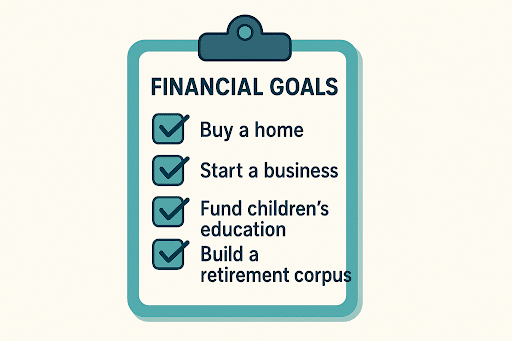Table of Contents
Financial independence and security are no longer optional for women—they’re essential. In today’s world, women are earning more, managing households, starting businesses, and planning their own retirements. Yet many still face unique challenges, such as career breaks, wage gaps, and increased life expectancy. This makes financial planning for women not just important but urgent.
This comprehensive guide breaks down the key steps every woman should take to secure her financial future, from budgeting and saving to investing and retirement planning.
Why Financial Planning Matters for Women
Women often experience different financial journeys than men. Career interruptions for childcare, longer life spans, and persistent pay gaps can reduce lifetime earnings and savings potential.
Proper planning helps women:
- Build a financial safety net.
- Achieve independence and long-term security.
- Prepare for emergencies and retirement.
- Invest with confidence to grow wealth.
Without a plan, these challenges can lead to financial vulnerability later in life.
Setting Clear Financial Goals

Financial planning starts with defining your goals. These might include:
- Buying a home.
- Starting a business.
- Funding children’s education.
- Building a retirement corpus.
Write down your short-term (1–3 years), medium-term (3–7 years), and long-term (7+ years) goals. This clarity helps prioritize your spending, saving, and investing strategies.
Budgeting Tips for Women
Budgeting is the foundation of good financial health. Creating a budget helps you control spending and identify areas for saving.
Key tips:
- Use the 50/30/20 rule (50% needs, 30% wants, 20% savings/investments).
- Track your expenses monthly.
- Cut unnecessary costs and redirect savings toward your financial goals.
With a solid budget, you’ll always know where your money is going—and how to make it work harder for you.
Emergency Fund Essentials
Life is unpredictable. A well-funded emergency reserve can protect you from financial setbacks caused by job loss, health issues, or unexpected expenses.
Build an emergency fund covering at least 3–6 months of living expenses. Keep this money in a high-interest savings account or a liquid fund for easy access.
Debt Management Strategies
Debt can be a major roadblock to financial freedom. Women often juggle multiple responsibilities, which can lead to credit card debt, personal loans, or education loans.
Smart ways to handle debt:
- Pay off high-interest debts first.
- Consolidate loans where possible.
- Avoid taking on unnecessary new debt.
Eliminating debt quickly frees up income for investments and savings.
Investment Options for Women
Investing is key to building wealth over time. Simply saving money isn’t enough because inflation erodes purchasing power.
Consider these investment avenues:
- Mutual Funds – Diversified and professional management.
- Stocks/Equity – Higher growth potential but more risk.
- Fixed Deposits – Low risk, stable returns.
- Bonds or Debt Funds – Moderate risk, steady income.
- Retirement Accounts – PPF, NPS, or employer-sponsored plans.
Start small but start early. Even small contributions grow significantly over decades due to compounding.
Retirement Planning Made Simple
Retirement planning is critical for women, especially given their longer life expectancy. Begin by estimating how much you’ll need each month in retirement and work backward to determine how much to save now.
Key tips:
- Contribute to retirement accounts regularly.
- Increase contributions as your income grows.
- Diversify your portfolio to manage risk.
The earlier you begin, the less you’ll need to save each month.
Insurance and Protection Plans
A good financial plan also includes risk management. Insurance protects your savings from unforeseen events.
Essential covers include:
- Health insurance.
- Life insurance.
- Disability and critical illness cover.
This ensures you and your loved ones won’t face financial ruin during tough times.
Building Long-Term Wealth
Wealth building isn’t about sudden windfalls; it’s about consistent, disciplined efforts over time.
Strategies include:
- Regular investing through SIPs (Systematic Investment Plans).
- Increasing savings rate as your income grows.
- Diversifying your portfolio to minimize risk.
Long-term wealth provides not only security but also freedom of choice—whether to travel, start a business, or retire early.
How to Achieve Financial Independence
Financial independence means having enough resources to support your lifestyle without depending on others. For women, this can be especially empowering.
Steps to achieve it:
- Live below your means.
- Invest in income-generating assets.
- Continuously upgrade your financial knowledge.
The more proactive you are, the sooner you’ll reach independence.
Introducing eairwoman financial planning for women
If you’re looking for tailored guidance and actionable strategies, eairwoman financial planning for women offers expert resources to help you take control of your finances. From budgeting and investing to retirement planning, it’s a valuable tool for women at every stage of their financial journey.
Practical Tips to Stay on Track
Financial planning is an ongoing process. Regularly review your progress to ensure you’re on target.
Tips for staying on track:
- Review your goals annually.
- Adjust your budget as life circumstances change.
- Seek professional advice when needed.
This keeps your plan flexible and aligned with your evolving life.
Final Thoughts
Financial planning isn’t just about money, it’s about peace of mind, freedom, and empowerment. By setting clear goals, budgeting wisely, investing consistently, and protecting yourself with insurance, you can secure a brighter future.
Start small, be consistent, and use resources like eairwoman to guide you. Every step you take today brings you closer to long-term financial independence.
